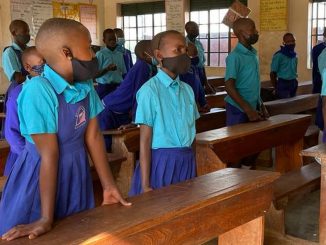
Every evening we check the news to see how many cases of Covid-19 were recorded today because we know we are guaranteed to be told. What we aren’t as often told about is the lingering effects of the coronavirus, better known as ‘long covid’.
According to the World Health Organisation (WHO), most people who are diagnosed with Covid-19 experience mild or moderate symptoms. Among these patients, about 10-15% of cases progress to severe disease and approximately 5% unfortunately become critically ill.
Normally, people recover from the virus after two to six weeks. However, some people will have symptoms that linger or recur for weeks or months after their initial recovery, during this time the person is not infectious or contagious. Some patients even develop medical complications that can have long lasting health effects, WHO explains.
In a study carried out by WHO, persistent symptoms that people reported included; fatigue, cough, congestion, shortness of breath, loss of taste or smell, headaches, body aches, diarrhoea, nausea, chest or abdominal pain and confusion. The most common unresolved symptoms were a cough and fatigue.
Tracey Abrahams, owner of the blog Hooks and Dragons, was admitted to hospital with Covid-19 on the 31st of March for a total of three months. After a short walk around her area, Abrahams returned home completely unable to breathe and was soon after rushed into the hospital.
The next day, she was taken to an intensive care unit (ICU) and sedated for several weeks. During her induced coma, Abrahams had doctors regularly slap her back to loosen any phlegm that her lungs produced as a reaction to the virus. In a recent blog post, Abrahams described this as “drowning in my own secretions.”
A lot of damage was done to her lungs due to the virus. On top of that, Abrahams suffered from several lung infections and unfortunately had an allergic reaction to one of the antibiotics and has since been referred to an allergy specialist.
Abrahams told The College View that she still had to go through a “fair amount” of rehabilitation when she returned home. She can now only walk short distances, finds using the stairs difficult and now suffers with breathlessness and fatigue.
Although she has been discharged from hospital, her ICU team have set her up on an intensive follow up programme in which she attends check-ups every three months. So far, Abrahams has visited the physiotherapist, psychiatrist, had a heart scan, a CT scan and is yet to undergo lung function tests.
When asked about her mental health after the hard journey, Abrahams said: “For me I have been through the worst and come out the other side, so that’s a positive.”
Due to the severity of her aftereffects, the 47-year-old had no choice but to stop working as a cleaner and even finds it difficult to clean around the house without the help of her husband. Currently, she is on furlough but doesn’t know when she will be fit to return to work.
“The docs are saying it could be up to two years before I’m back to full health [and] after two years any remaining disability is considered to be permanent,” said Abrahams, “they can’t be expected to hold the post open that long.”
While she understands that her lingering symptoms could be down to the time she spent in ICU, she believes that ‘long covid’ is definitely a problem many other people are facing. Abraham explains that her sister-in-law had mild symptoms of Covid-19 and now suffers from exhaustion.
According to WHO, Covid-19 can result in prolonged illness even in young adults and children who don’t have any underlying medical conditions. In their survey, 1 in 5 healthy people aged 18-34 years reported that some of their symptoms were prolonged.
Not all patients who suffer with ‘long covid’ are at risk, however high blood pressure, obesity and mental health conditions are considered risk factors by WHO.
As part of their survey, WHO compared this coronavirus with Severe Acute Respiratory Syndrome (SARS) that effected 26 countries in 2003. They found that there was evidence of persistent and significant impairment of the health and exercise capacity in survivors of SARS over the course of a year.
In a similar study, WHO found that 40% of those recovering from SARS still had chronic fatigue and exhaustion symptoms three and a half years after being diagnosed.
While more research is needed to understand the long-standing effects of Covid-19, WHO said that it may increase the risk of long-term health problems such as lung failure, loss of smell, memory, concentration, post-traumatic stress disorder, depression, fatigue and more.
It is important that we continue to protect ourselves and others from Covid-19 with these nine essential measures:
- stay home and self-isolate if you feel unwell;
- clean your hands frequently and properly;
- cover your nose and mouth when you cough and sneeze with your elbow or a tissue;
- avoid touching your mouth, nose and eyes, maintain a 2m social distance from others;
- avoid crowds and poorly ventilated indoor areas;
- use a fabric mask where social distancing isn’t feasible;
- use a medical or surgical mask if you are at a higher risk and;
- regularly clean and disinfect surfaces you frequently touch.
More time and research will be needed to further understand how badly patients are affected by long-term effects of Covid-19 as well as which symptoms are most persistent and what treatment is best to allow patients to fully recover. What we can do now is ensure everyone is properly educated on this deadly virus and takes every measure possible to stay safe.
If you start to develop any symptoms of Covid-19 contact your GP immediately and visit https://www2.hse.ie/coronavirus/ for more information on symptoms, testing and more.
Note: This article was reuploaded on 04/04/21 due to a fault with The College View website.
Emily Clarke
Image credit: shane-hfvFunLkFgg-unsplash



